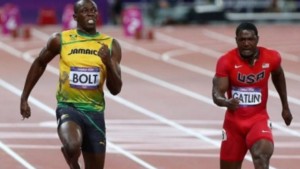 IN light of the widespread accusation of the ruling International Association of Athletics Federations (IAAF) perceived cover up in track and field, former British sprinter Darren Campbell hopes Justin Gatlin beats Usain Bolt to force the sport to “deal” with drugs cheats.
IN light of the widespread accusation of the ruling International Association of Athletics Federations (IAAF) perceived cover up in track and field, former British sprinter Darren Campbell hopes Justin Gatlin beats Usain Bolt to force the sport to “deal” with drugs cheats.
With the World Championship just nine days away, the debate as to who will win the blue ribbon 100m event and be crowned the fastest man on Earth rages on.
The eagerly anticipated clash between Jamaica’s reigning champion, Bolt, and the maverick American Gatlin is definitely the talking point and will be for a very long time regardless of the outcome.
The purists are anxious for athletics poster boy Bolt to defeat the much-tainted Gatlin, who served two drugs bans, but is on top of his game having run the four fastest times in the world this year.
In an interview with BBC Radio 5, Campbell, who won silver in the 200m at the 2000 Olympics, said a victory for Gatlin would put the spotlight on athletics and basically force the IAAF to deal with the controversial issue.
“The fairytale is that Usain Bolt beats Justin Gatlin, but in a crazy kind of way I want to see Justin Gatlin beat Usain Bolt because the sport will have to deal with it,” said Campbell, who is a 100m bronze medallist in 2003 at the World Championship in Paris.
“The spotlight will be truly on the sport and the sport, will have to make a decision. It’s not a decision about throwing out Justin Gatlin, but about how do you [IAAF] want to be perceived in the future,” he noted.
So all eyes will be fixed on the 100m final set for August 23 when the 33-year-old Gatlin, who set a personal best of 9.74 seconds at the age of 33 in May, and Bolt, who turns 29 on August 21 and has a season’s best of 9.87 done on July 24, will face each other.
With the IAAF under renewed pressure with another doping scandal, a victory for Gatlin would not help their cause.
Gatlin was banned for two years in 2001 and then again in 2006, originally for eight years rather than life after agreeing to help the US Anti-Doping Agency, but that was reduced to four years.
BBC’s chief sports writer, Tom Fordyce in his column “Justin Gatlin: Why US sprinter’s success is bad for athletics” said, “To run 9.77 dirty is one thing but to do so again, supposedly clean at an age when no other man has got close, is too much for some to believe.”
Dai Greene, Britain’s 2011 400m hurdle world champion, was quoted as saying: “It shows one of two things: Either he’s still taking performance-enhancing drugs to get the best out of him at his advanced age, or the ones he did take are still doing a fantastic job.”
But with Gatlin running the four fastest times this year with 9.74, 9.75 (twice) and 9.78 for the 100m, and the two quickest times for the 200m in 19.57 and 19.68, the purists are waiting with bated breath that Bolt wins and keeps the sport from falling into chaos.
